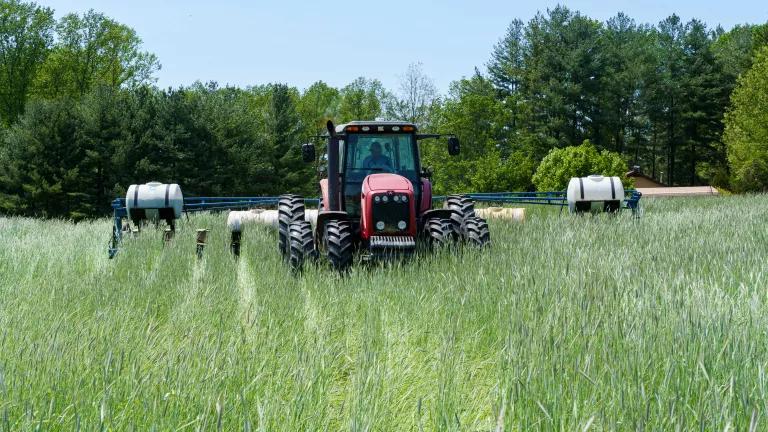If a government agency shamelessly caves to industry pressure but everyone is around to see—and Tweet—about it as it happens, do Americans win or lose?
Earlier this week, the U.S. Department of Agriculture (USDA) published an interoffice newsletter on its website telling staff that one easy way they could reduce their environmental footprint was to participate in “Meatless Mondays”, a global campaign that asks individuals to skip meat on Mondays in favor of vegetarian options:
“One simple way to reduce your environmental impact while dining at our cafeterias is to participate in the “Meatless Monday” initiative…While a vegetarian diet could have a beneficial impact on a person's health and the environment, many people are not ready to make that commitment," the newsletter said. "Because Meatless Monday involves only one day a week, it is a small change that could produce big results." [You can read the full passage on page 3 here.]
Then came the backlash, led by the National Cattlemen's Beef Association, and within hours the agency caved and pulled the posting.
USDA’s shameful backpedaling to appease the meat industry reveals two important issues about the state of our food system and how we relate to it.
First, it highlights just how stuck the USDA is between an ostensible mission to help Americans eat healthier foods, reflected in the agency’s update of its dietary guidelines to place greater emphasis on getting more whole grains, fruits, vegetables, and lower-impact proteins onto our plates, and its role as marketer-in-chief of the food products our industrial agriculture system is currently [over]-producing, including meat. Reporting the story yesterday, the Associated Press said it plainly: “The USDA often promotes the beef industry by encouraging Americans to eat meat.”
At the same time, USDA’s reflexive decision to yank their Meatless Monday endorsement shows how out of touch the agency is with American health and dietary trends.
Americans still eat a lot of meat, but we’re eating less and less of it. As Mark Bittman wrote earlier this year in his NY Times column, Meatless Mondays have become a cultural force, and more and more Americans are significantly cutting their meat consumption for health reasons, as well as a greater awareness of the environmental benefits of switching to plant-based options. Bittman cites the rise of “flexitarianism”—an eating style that reduces the amount of meat without “going vegetarian” — as one of the top consumer health trends for 2012.
Here’s what that trend line looks like over time:
And USDA projects that our meat and poultry consumption will fall again this year, to roughly 12.2% less in 2012 than it was in 2007.
This is good news. Not just for our health but for the health of the environment.
The impacts of the U.S. livestock system are notorious. Livestock production is the single most damaging sector of agriculture, causing massive habitat degradation and biodiversity loss, erosion and desertification, and air pollution, including an estimated 18% of global greenhouse gases when emissions from related deforestation are taken into account[1]. It is also the largest and least regulated source of water pollution in the nation. By feeding chickens, pigs, and cows massive amounts of antibiotics to compensate for dirty and crowded conditions in factory farms, the industry also exacerbates the alarming problem of antibiotic resistance that poses grave risks to human health.
How much and what kind of meat we choose to eat matters. And every time we eat, we get to make empowering decisions that, no matter how seemingly small, add up to real benefits.
Going meatless doesn’t mean going protein-less. There’s a plethora of lower-impact forms of protein available to us whenever we choose to skip meat, be it on Meatless Mondays or beyond. According to estimates by the Humane Society of the United States, if every American embraced Meatless Mondays, we would need to raise 1.4 billion fewer farm animals. That translates into a lot fewer toxic chemicals, reduced climate pollution, healthier soils and waterways, and a lot less animal cruelty.
But when we do choose to eat meat, there are easy ways to choose more sustainably-produced products. While there are fewer sustainable meat options—or tools to help consumers identify them—than we’d like to see, meat shoppers looking for safer, healthier, and more sustainable meat products can look for the USDA Organic label, as well as meat labeled “no antibiotics” backed by “USDA Process Verified” or another independent certification.
No amount of meat industry lobbying changes the facts. Reducing your meat consumption—with Meatless Mondays or otherwise—is one of the best things individuals can do to reduce their environmental “foodprints”. So eat your vegetables—and fruits and grains and legumes—and let us know what you’re eating on Mondays!
[1] Food and Agriculture Organization, 2006



